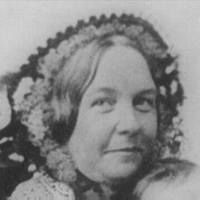Elizabeth Cady Stanton

Elizabeth Cady, born on this day in 1815 in Johnstown, New York, was the 7th of 10 children, the daughter of a New York jurist. Her only brother died when she was 11, leaving her father distraught at the prospect of not leaving a male successor.
At that moment, she recalled, she wanted to be everything a man could be. She consciously pursued her goal by studying Greek and horse handling, to become "learned and courageous" like the men she knew. She would never gain the recognition she sought from her father, a fact which perhaps drove her throughout her life to pursue equality for women. She studied at Emma Willard's seminary (1830-32), and through anti-slavery activities met her future husband and father of her 7 children, Henry Stanton, whom she married in 1840 (with the word "obey" stricken from their ceremony).
Immediately after the ceremony, the Stantons attended the World Anti-Slavery Convention in London, but Elizabeth was shocked to find that she and Lucretia Mott were refused admission to the Convention on the grounds of their sex. As a response to this narrow-mindedness, the two women eventually called the first women's rights convention at Seneca Falls on July 19-20, 1848, at which Elizabeth Cady Stanton's "Declaration of Sentiments," the first public demand for women's suffrage in the U.S., was read, marking the beginning of a 72-year struggle for the right to vote.
In 1849, Stanton co-founded, with Amelia Jenks Bloomer, a women's rights journal, The Lily, in which Stanton pounded at practical themes aimed at reducing the artificial barriers between male and female activity, including the promotion of dress reform and the wearing of "bloomers" (named for her cohort), loose trousers covered by a short skirt for ease of movement. In 1851, she met Susan B. Anthony, and soon Stanton and Anthony became partners in the cause, with Stanton staying home with her children and writing the speeches, and the unmarried Anthony stumping on the circuit. As Stanton observed: "While she is slow and analytical in composition, I am rapid and synthetic. I am the better writer, she the better critic. She supplied the facts and statistics, I the philosophy and rhetoric, and together, we have made arguments that have stood unshaken through the storms of long years; arguments that no one has answered."
Stanton's philosophy, representing a convergence of Comte, Spencer and Fourier molded around feminist principles, tugged her past women's suffrage at times to defend even more controversial ideas, such as free love and eugenics. As Stanton's children grew, she began to play a more active role in the movement, being the first woman to address a joint session of the New York state legislature (1860), arguing against the 14th Amendment (which granted the right to vote to African-Americans but not to women; her disdain for African-Americans and indeed for recent immigrants and members of the working class was often unvarnished in her pronouncements), running for Congress (1866), campaigning around the country for suffrage and engaging in civil disobedience by attempting to vote.
In 1892, she delivered her most famous address, "The Solitude of Self," before the Senate and House judiciary committees. In 1892, nearly blind, she published The Woman's Bible, an attempt to "correct" biblical interpretations which demeaned women; her criticism of Judaism and Roman Catholicism within the book caused it to be condemned by the 1896 convention of the National American Woman Suffrage Association (an organization of which she once served as president), signaling that Stanton's WASP-supremacy leanings were no longer embraced by the new fighters for women's suffrage.
Nonetheless, by the 1880s, although women's suffrage was still a number of years away, Stanton was revered as an elder statesperson, her 80th birthday celebrated as "Stanton Day" in New York City with a festival at the Metropolitan Opera. Susan B. Anthony highlighted Stanton's preeminent role as wordsmith of the women's suffrage movement following her death on October 26, 1902 by noting, "Well, it is an awful hush." Stanton's daughter, Harriet Stanton Blatch, followed in her mother's footsteps as a suffrage activist.
Labels: Trailblazing Women





0 Comments:
Post a Comment
Subscribe to Post Comments [Atom]
<< Home